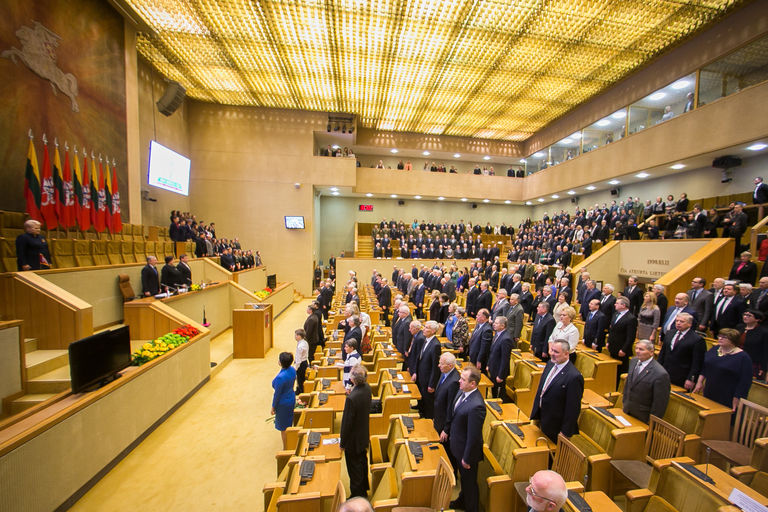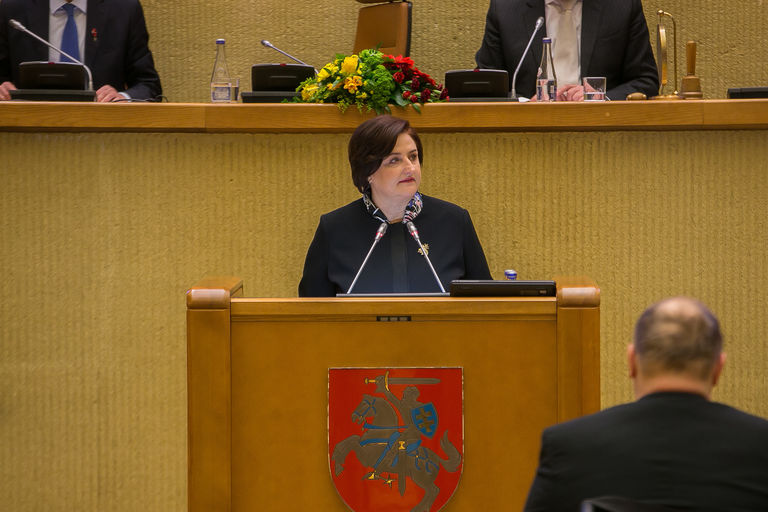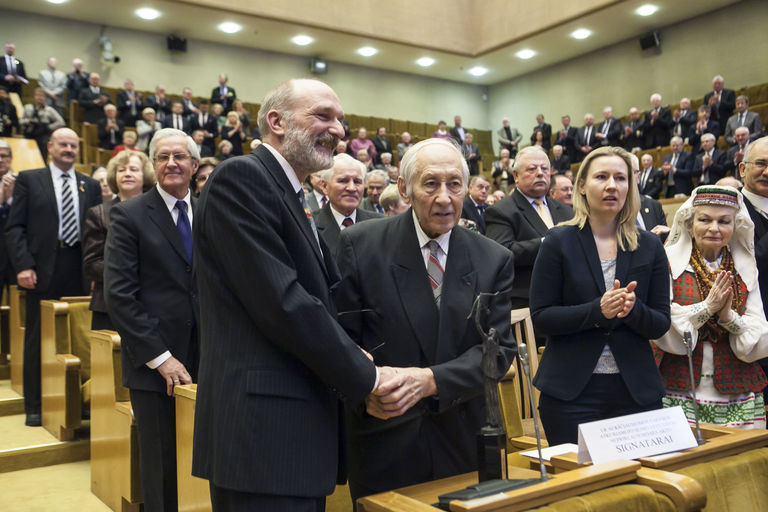Press release, 11 March 2016
On 11 March 2016, the Seimas held a solemn sitting to commemorate the Day of Restoration of Lithuania’s Independence. The commemoration featured speeches by Loreta Graužinienė, Speaker of the Seimas; Stasys Kropas, Signatory to the Act of Independence and President of the Association of Lithuanian Banks; Arūnas Poniškaitis, Bishop Auxiliary and General Vicar of Vilnius Archdiocese; Vytenis Povilas Andriukaitis, Signatory to the Act of Independence and Member of the European Commission; Emanuelis Zingeris, Signatory to the Act of Independence, Member of the Seimas and first Chairman of the Foreign Affairs Commission of the Supreme Council of Lithuania; and Rokas Štreimikis, representative of the Lithuanian Pupil’s Parliament and a pupil of St Benedict’s High School in Alytus.

In her speech, the Speaker of the Seimas underlined the importance of local communities. “The Seimas has declared the year 2016 as the Year of Local Communities. I am truly happy and positive about the initiative. I feel it has a great sense of purpose and necessity. People congregating into communities based on their area of residence constitutes a crucial condition for the strengthening of civil society, which is understood as, first and foremost, the ability of citizens to join into associations independent from the state and be actively engaged in public affairs,” the Speaker of the Seimas explained.

Loreta Graužinienė maintained that at the moment, there are about 1,800 active local communities in Lithuania. “As we witness the wonderful community activities by our citizens, we have to ask ourselves whether we, state politicians and career civil servants, do everything that is in our power to make local communities the real civil force to be reckoned with and able to represent people’s interests and help local authorities to deal with daily problems of the citizens,” she said. The Speaker of the Seimas argued that the strength of local communities gained a new meaning in the context of the changed geopolitical situation when Russia, our Eastern neighbour, started breaking international policy rules and when Europe was being flooded with hundreds of thousands of war refugees. “A strong community, together with local authorities, makes up an organisational structure able to contribute to overcoming new challenges and enhancing the sense of security of community members at the same time. In return, active engagement within a community nurtures patriotism among citizens. I would like to believe that the Year of Local Communities will serve as a powerful stimulus for civil activeness for the whole country,” Loreta Graužinienė highlighted.
Stasys Kropas, Signatory to the Act of Independence and President of the Association of Lithuanian Banks, expressed his concern over the model of the education system. “I have deep respect for the Lithuanian teachers, and I am grateful to them for the knowledge and skills they have imparted to me and my children. However, I am concerned about my grandchildren, because I do not know any more what kind of education they are going to receive from the constantly changing Lithuanian education system. We can engage in demolition and construction if we want to see improvement in the quality of education, but we must do that with determination,” Stasys Kropas said. He believed discussions of politicians and trade unions did not voice the concerns about the education of pupils, its quality and the loss of competitiveness compared to other countries. “It seems as though pupils are but a tool in the fight for school renovation or size of the pupil’s basket. Regrettably, trade unions did not bring any best practices from progressive countries to the negotiations. Meanwhile, political parties, unfortunately, moan only about teachers’ salaries,” Stasys Kropas regretted. When referring to politicking that moves to institutions regulating the economy or business, Stasys Kropas encouraged everyone to prevent disappointment from affecting the creative, bold and young people who are proud of Lithuania’s achievements and are willing to contribute to its prosperity.
Arūnas Poniškaitis, Bishop Auxiliary and General Vicar of Vilnius Archdiocese, noted that the 11th of March served as though a starting point for our nation’s unity that we could annually relive all over again. “Even though we are different, there is something we have in common. There is something we can be proud of and appreciate. There is something we are responsible for and accountable to. And that is Lithuania, our homeland, which has been given to us and entrusted upon us. Today, we are once again able to take a deep breath of freedom, which has a taste of responsibility. We are once again repeating to ourselves that we are as free as we are able to take responsibility for ourselves and for each other,” the Bishop said. He concluded his speech by saying that he did not imagine the free Lithuania as a highway, which may be used by some to achieve their goals. Rather, he believed that Lithuania resembled the Baltic Way, which required everybody joining their hands.
Vytenis Povilas Andriukaitis, Signatory to the Act of Independence and Member of the European Commission, stressed that the people of Lithuania, together with the participants of the second national revival movement, made our country to evolve from the Soviet Lithuania into the Republic of Lithuania in the historical period of 1988–1990. “Led by the brightest stars of the revival era, such as Arvydas Juozaitis, Algirdas Kaušpėdas, Antanas Terleckas, Valdas Adamkus, Justinas Marcinkevičius, Vytautas Landsbergis, Kazimieras Antanavičius, Aloyzas Sakalas, Justas Paleckis, Algirdas Mykolas Brazauskas, Kazimira Danutė Prunskienė and others, the millions of people from Lithuanian towns and cities, including members of the Reform Movement Sąjūdis and participants of the Baltic Way, paved the way for today’s Lithuania, transforming it from a Soviet state into a democratic republic, which gave birth to today’s young citizens of the Republic of Lithuania,” Vytenis Povilas Andriukaitis said.
“If we took into consideration the constitutional principle of the EU, which is the rule of law, the events in Hungary and Poland, and the difficult debates on constitutionality, we could draw a conclusion that Dr Kazys Grinius was able to envisage a direct relation between the EU and the Lithuanias of 1922, 1948 and 1992. What mattered the most were the principle of respect for human rights and freedoms, the rule of law, and a democratic parliamentary republic,” Vytenis Povilas Andriukaitis observed.
The Member of the European Commission explained that today one could definitely conclude that the rule of law meant that human dignity was inviolable. “Therefore, dissemination of secret verbatim reports or secret notes is incompatible with the rule of law, hence should not be allowed, for human dignity is inviolable, be it in social networks or anywhere else. It is our fundamental principle, as we respect different convictions, opinions and world-views we all may have. That is why we maintain and clearly say that Lithuania has chosen this particular path and that Lithuania can have the courage to defend human rights and freedoms and respect every citizen. Long live democratic parliamentary Lithuania, with some features of a semi-presidential republic! Long live today’s Lithuania, which is celebrating its 26th anniversary!” Vytenis Povilas Andriukaitis noted.
Emanuelis Zingeris, Signatory to the Act of Independence, Member of the Seimas and first Chairman of the Foreign Affairs Commission of the Supreme Council of Lithuania, recalled the dialogue held with many countries on Lithuania’s road to independence and that this year will mark the 25th anniversary of the restoration of diplomatic relations.
While congratulating everyone on the Day of Restoration of Lithuania’s Independence, Rokas Štreimikis, representative of the Lithuanian Pupil’s Parliament and a pupil of St Benedict’s Gymnasium in Alytus, hoped that the 11th of March was the day which encouraged every Lithuanian to not only enjoy freedom but also assume responsibility related to that freedom, i.e. responsibility to be today’s hero and responsibility towards the state, community, family, and, most importantly, towards yourself.
The event concluded with the awarding of a statuette Žinia (Engl. Message) to Balys Gajauskas, Signatory to the Act of Independence, political prisoner and dissident, to mark his 90th anniversary. “Kept in prison for as many as 37 years, he has been the longest-serving political prisoner in all the Baltic States. He was imprisoned in Soviet hard labour camps for fighting for Lithuania’s independence, and he did not cease to fight even in the worst conditions of imprisonment. We are grateful for his unbreakable determination and strength. On behalf of all of us present here, please accept our congratulations to you, Mr Gajauskas, on your jubilee anniversary,” the Speaker of the Seimas said.

Photos of the Office of the Seimas (author Olga Posaškova)
“We would like to sincerely congratulate you, Dear Mr Gajauskas, on your venerable anniversary. With your greatness, inner beauty and wisdom, you have become a strong pillar of the Lithuanian nation and state. We are grateful to you for your devotion to our homeland and wish you spiritual strength, creative wisdom and good health. May you be marked by the message of Lithuania’s freedom, which signifies your lifetime achievements and serves as a reward for them on behalf of the whole country,” said Saulius Pečeliūnas, Signatory to the Act of Independence, as he presented Mr Gajauskas with the statuette Žinia.
Rimas Rudaitis, Senior Specialist, Press Office, Information and Communication Department, tel. +370 5 239 6132, e-mail: [email protected]





